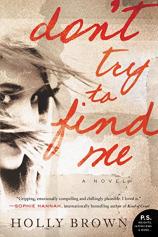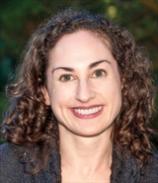Reading Group Guide
Discussion Questions
Don't Try To Find Me

1.We first meet Rachel when she's discovered her daughter is missing. What were your initial impressions of her? How did your perspective evolve?
2. "She's a normal teenager, i.e., moody maybe, but not depressed." These are Rachel's thoughts upon reading Marley's goodbye note on the white board. Does this characterize the Marley you come to know over the course of the book? Is she depressed? If she ordinary, or exceptional? Is Rachel out of touch with who her daughter truly is?
3. "Normal teenagers don't run away. Ergo, she didn't run away," Rachel goes on to think. This exposes the first of many of Rachel's blind spots. If you're a parent yourself, what do you think your blind spots might be? Are we all prone to some forms of denial?
4. What kind of wife is Rachel? What kind of husband is Paul? How do you imagine their marital dynamics shaped Marley and her view of relationships?
5. If Rachel had monitored Marley more closely --- including her social media --- would their story have been different? How do you think social media impacts teens and their ability to connect with each other, their parents, and the world around them?
6. What do you think Marley was really looking for in her relationship with B.? What does it say about her that she chose to be involved with him? Did B. lure Marley or was she looking for a way out, or both?
7. When a teenager runs away, do you think that the parents are always responsible, on some level?
8. What's the significance of the Teen Angst playlist in the novel? What does it mean to Marley, to Rachel and to their connection with one another?
9. Is there a victim in the novel? More than one? Who gives up their power and control? In what ways, and for what reasons?
10. Have you ever kept secrets? What would you do if you knew that a social media campaign had the potential bring your runaway child home but could also expose those secrets to an unforgiving public?
11. A theme in the novel is visibility. In this social media-saturated world, is it more important to be seen than to be known? To be "liked" (i.e. on Facebook) as opposed to truly liked?
12. "Opposite-speak is different from lying, because when you use it, you always know. You're never trying to fool yourself," Marley writes in her journal, as a way to contrast herself and her mother. "The worst thing you can be is a liar to yourself." Do you agree?
13. Dr. Michael is very important to both Marley and Rachel. Is he a destructive or a constructive force? What do you imagine his intentions to be?
14. If you were Paul, would you forgive Rachel? If you were Rachel, would you want to salvage the marriage?
15. Were you surprised to discover Rachel's prescription drug abuse? Did it cause you to reexamine her behavior throughout the novel?
16. Rachel and Marley both ultimately tap into their individual strength, resilience and authenticity. But it's at a cost. Is this a novel about empowerment, or something else? What have they learned about themselves, each other and their relationship? What comes next for them?
Don't Try To Find Me
- Publication Date: April 7, 2015
- Genres: Fiction, Psychological Suspense, Psychological Thriller, Suspense, Thriller
- Paperback: 384 pages
- Publisher: William Morrow Paperbacks
- ISBN-10: 0062305859
- ISBN-13: 9780062305855








